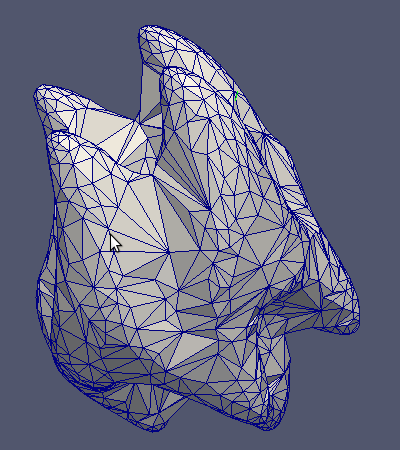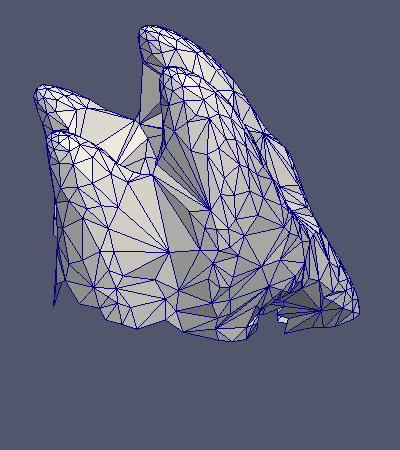Cut Mesh#
Synopsis#
Given a bounding box and a mesh, first retrieve all vertices whose coordinates are in the bounding box; then retrieve all faces connected to these vertices.
Results#

Input mesh#

Output mesh (cut)#
Interactive input mesh
Interactive cut output mesh
Code#
C++#
#include "itkQuadEdgeMesh.h"
#include "itkQuadEdgeMeshPolygonCell.h"
#include "itkMeshFileReader.h"
#include "itkMeshFileWriter.h"
int
main(int argc, char * argv[])
{
if (argc != 3)
{
std::cerr << "Usage: " << std::endl;
std::cerr << argv[0];
std::cerr << " <InputFileName> <OutputFileName>";
std::cerr << std::endl;
return EXIT_FAILURE;
}
const char * inputFileName = argv[1];
const char * outputFileName = argv[2];
constexpr unsigned int Dimension = 3;
using CoordType = double;
using MeshType = itk::QuadEdgeMesh<CoordType, Dimension>;
using MeshPointer = MeshType::Pointer;
using MeshPointsContainerPointer = MeshType::PointsContainerPointer;
using MeshPointsContainerIterator = MeshType::PointsContainerIterator;
using MeshPointType = MeshType::PointType;
using MeshPointIdentifier = MeshType::PointIdentifier;
using MeshCellIdentifier = MeshType::CellIdentifier;
using ReaderType = itk::MeshFileReader<MeshType>;
auto reader = ReaderType::New();
reader->SetFileName(inputFileName);
MeshPointer mesh = reader->GetOutput();
MeshPointer output = MeshType::New();
std::map<MeshPointIdentifier, MeshPointIdentifier> verticesMap;
std::set<MeshCellIdentifier> facesSet;
MeshPointsContainerPointer points = mesh->GetPoints();
MeshPointsContainerIterator pIt = points->Begin();
MeshPointsContainerIterator pEnd = points->End();
while (pIt != pEnd)
{
MeshPointType p = pIt->Value();
if ((p[2] < 0.))
{
// here you do not want to use operator = to copy the coordinates from the
// input mesh to the output one. Indeed the operator = does not only copy
// the coordinates, but also the pointer to first QuadEdge of the 0-ring,
// and it would be wrong.
MeshPointType q;
q.CastFrom(p);
verticesMap[pIt->Index()] = output->AddPoint(q);
// iterate on the 0-ring (vertex neighbors)
MeshType::QEType * qe = p.GetEdge();
MeshType::QEType * temp = qe;
do
{
// insert the corresponding faces into std::set
facesSet.insert(temp->GetLeft());
temp = temp->GetOnext();
} while (qe != temp);
}
++pIt;
}
MeshType::CellsContainerPointer cells = mesh->GetCells();
using PolygonType = itk::QuadEdgeMeshPolygonCell<MeshType::CellType>;
// iterate on the faces to be added into resulting mesh
for (auto fIt : facesSet)
{
auto * face = dynamic_cast<PolygonType *>(cells->ElementAt(fIt));
MeshType::PointIdentifier id[3];
if (face)
{
MeshType::QEType * qe = face->GetEdgeRingEntry();
MeshType::QEType * temp = qe;
unsigned int k = 0;
// iterate on the vertices of a given face
do
{
// add the corresponding vertex into the output mesh if it has not been added yet
if (verticesMap.find(temp->GetOrigin()) == verticesMap.end())
{
MeshType::PointType p = mesh->GetPoint(temp->GetOrigin());
MeshType::PointType q;
q.CastFrom(p);
verticesMap[temp->GetOrigin()] = output->AddPoint(q);
}
id[k++] = verticesMap[temp->GetOrigin()];
temp = temp->GetLnext();
} while (qe != temp);
// add the corresponding face into the output mesh
output->AddFaceTriangle(id[0], id[1], id[2]);
}
}
// save the corresponding mesh
using MeshWriterType = itk::MeshFileWriter<MeshType>;
auto writer = MeshWriterType::New();
writer->SetInput(output);
writer->SetFileName(outputFileName);
try
{
writer->Update();
}
catch (const itk::ExceptionObject & e)
{
std::cerr << "Error: " << e << std::endl;
return EXIT_FAILURE;
}
return EXIT_SUCCESS;
}
Classes demonstrated#
-
template<typename TPixel, unsigned int VDimension, typename TTraits = QuadEdgeMeshTraits<TPixel, VDimension, bool, bool>>
class QuadEdgeMesh : public itk::Mesh<TPixel, VDimension, TTraits> Mesh class for 2D manifolds embedded in ND space.
This implementation was contributed as a paper to the Insight Journal
https://www.insight-journal.org/browse/publication/122- Author
Alexandre Gouaillard, Leonardo Florez-Valencia, Eric Boix
